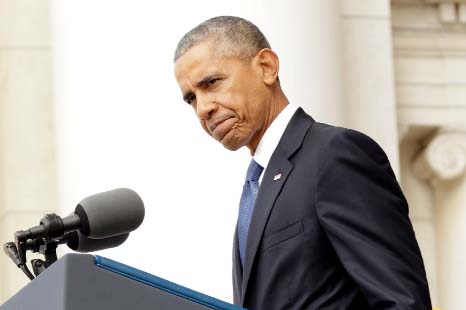
AFP, Washington :
Barack Obama will travel Monday to Greece and Germany in a final official visit designed, in a strange bit of political contortion, at reassuring worried Europeans about a man he once warned was “unfit” for the presidency: Donald Trump. The irony is cruel: In the name of a peaceful transition, the American president, having thoroughly denounced the billionaire Republican during the recent campaign, must now do his best to reassure his European counterparts about the future of American democracy under a President Trump.
“I think the design of the trip was meant to just give everybody some reassurance that we made it through this campaign and we’re going to come out of it all right,” said Heather Conley of the Center for Strategic and International Studies, in Washington. “We just have a different scenario now.” The bombastic populist, whose victory over Hillary Clinton surprised virtually everyone, has given Europeans ample cause for concern. He has questioned the relevance of some of America’s paramount alliances, starting with NATO; put the Paris climate-change accord in doubt by calling global warming “a hoax,” and sharply criticized the strenuously negotiated pact that Washington and five other countries signed with Iran to curb its nuclear program.
Trump’s attitude toward Russian President Vladimir Putin-the New York mogul called him “a leader, far more than our president has been a leader”-is deeply concerning in Europe, particularly in small countries like the Baltic nations living in Russia’s shadow.
Beyond the many concerns over the future of American foreign policy, many European Union countries are bracing for a possible ripple effect of the outspoken Republican’s victory.
“They are very worried, because the same populist, nationalist expressions” that Trump exposed in America on immigration and trade could amplify the already “very strong political currents within Europe,” Conley said.
She noted that several European countries have important elections coming up, not least of them the French presidential election next spring.
In Greece on Tuesday for his first visit there, Obama is set to meet with President Prokopis Pavlopoulos and Prime Minister Alexis Tsipras. He is expected to thank them for the “remarkable generosity” the Greek government and people have shown to the thousands of immigrants who have poured into the country from Africa and the Middle East.
Barack Obama will travel Monday to Greece and Germany in a final official visit designed, in a strange bit of political contortion, at reassuring worried Europeans about a man he once warned was “unfit” for the presidency: Donald Trump. The irony is cruel: In the name of a peaceful transition, the American president, having thoroughly denounced the billionaire Republican during the recent campaign, must now do his best to reassure his European counterparts about the future of American democracy under a President Trump.
“I think the design of the trip was meant to just give everybody some reassurance that we made it through this campaign and we’re going to come out of it all right,” said Heather Conley of the Center for Strategic and International Studies, in Washington. “We just have a different scenario now.” The bombastic populist, whose victory over Hillary Clinton surprised virtually everyone, has given Europeans ample cause for concern. He has questioned the relevance of some of America’s paramount alliances, starting with NATO; put the Paris climate-change accord in doubt by calling global warming “a hoax,” and sharply criticized the strenuously negotiated pact that Washington and five other countries signed with Iran to curb its nuclear program.
Trump’s attitude toward Russian President Vladimir Putin-the New York mogul called him “a leader, far more than our president has been a leader”-is deeply concerning in Europe, particularly in small countries like the Baltic nations living in Russia’s shadow.
Beyond the many concerns over the future of American foreign policy, many European Union countries are bracing for a possible ripple effect of the outspoken Republican’s victory.
“They are very worried, because the same populist, nationalist expressions” that Trump exposed in America on immigration and trade could amplify the already “very strong political currents within Europe,” Conley said.
She noted that several European countries have important elections coming up, not least of them the French presidential election next spring.
In Greece on Tuesday for his first visit there, Obama is set to meet with President Prokopis Pavlopoulos and Prime Minister Alexis Tsipras. He is expected to thank them for the “remarkable generosity” the Greek government and people have shown to the thousands of immigrants who have poured into the country from Africa and the Middle East.

